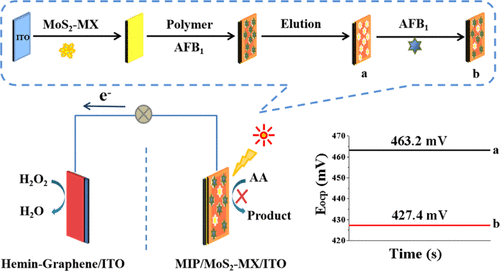当前位置:
X-MOL 学术
›
Anal. Chem.
›
论文详情
Our official English website, www.x-mol.net, welcomes your
feedback! (Note: you will need to create a separate account there.)
Photocatalytic Fuel Cell-Assisted Molecularly Imprinted Self-Powered Sensor: A Flexible and Sensitive Tool for Detecting Aflatoxin B1
Analytical Chemistry ( IF 6.7 ) Pub Date : 2021-09-16 , DOI: 10.1021/acs.analchem.1c02074 Yunxia Jin 1 , Yang Luan 1 , Zhen Wu 1 , Wei Wen 1 , Xiuhua Zhang 1 , Shengfu Wang 1
Analytical Chemistry ( IF 6.7 ) Pub Date : 2021-09-16 , DOI: 10.1021/acs.analchem.1c02074 Yunxia Jin 1 , Yang Luan 1 , Zhen Wu 1 , Wei Wen 1 , Xiuhua Zhang 1 , Shengfu Wang 1
Affiliation

|
The self-powered electrochemical sensor has gained big achievements in energy and devices, but it is challenging in analytical application owing to its low energy conversion efficiency and limited selectivity caused by the plentiful interference in actual samples. Herein, a new self-powered biosensor was constructed by the integration of a photocatalytic fuel cell (PFC) with a molecular imprinting polymer (MIP) to achieve sensitive and specific detection of aflatoxin B1 (AFB1). Compared with other fuel cells, the PFC owns the advantages of low cost, high energy, good stability, and friendly environment by using light as the excitation source. MoS2–Ti3C2Tx MXene (MoS2–MX) served as the photoanode material for the first time by forming a heterojunction structure, which can enhance the photocurrent by about 3-fold and greatly improve the photoelectric conversion efficiency. Aiming at the poor selectivity of the self-powered sensor, the MIP was introduced to achieve the specific capture and separation of targets without sample pretreatment. Using the MIP and PFC as recognition and signal conversion elements, respectively, the proposed self-powered biosensor showed a wide dynamic range of 0.01–1000 ng/mL with a detection limit of 0.73 pg/mL, which opened opportunities to design more novel self-powered biosensors and promoted its application in food safety and environmental monitoring.
中文翻译:

光催化燃料电池辅助分子印迹自供电传感器:一种灵活灵敏的黄曲霉毒素 B1 检测工具
自供电电化学传感器在能源和器件方面取得了很大的成就,但由于实际样品中的大量干扰导致其能量转换效率低和选择性有限,因此在分析应用中具有挑战性。在此,通过将光催化燃料电池 (PFC) 与分子印迹聚合物 (MIP) 集成,构建了一种新型自供电生物传感器,以实现对黄曲霉毒素 B1 (AFB 1 ) 的灵敏和特异性检测。与其他燃料电池相比,PFC以光为激发源,具有成本低、能量高、稳定性好、环境友好等优点。MoS 2 –Ti 3 C 2 T x MXene (MoS 2-MX)通过形成异质结结构首次作为光电阳极材料,可将光电流提高约3倍,大大提高光电转换效率。针对自供电传感器选择性差的问题,引入MIP实现了目标的特异性捕获和分离,无需样品预处理。分别使用 MIP 和 PFC 作为识别和信号转换元件,所提出的自供电生物传感器显示出 0.01-1000 ng/mL 的宽动态范围,检测限为 0.73 pg/mL,这为设计更新颖的自我开辟了机会动力生物传感器,并推广其在食品安全和环境监测中的应用。
更新日期:2021-10-06
中文翻译:

光催化燃料电池辅助分子印迹自供电传感器:一种灵活灵敏的黄曲霉毒素 B1 检测工具
自供电电化学传感器在能源和器件方面取得了很大的成就,但由于实际样品中的大量干扰导致其能量转换效率低和选择性有限,因此在分析应用中具有挑战性。在此,通过将光催化燃料电池 (PFC) 与分子印迹聚合物 (MIP) 集成,构建了一种新型自供电生物传感器,以实现对黄曲霉毒素 B1 (AFB 1 ) 的灵敏和特异性检测。与其他燃料电池相比,PFC以光为激发源,具有成本低、能量高、稳定性好、环境友好等优点。MoS 2 –Ti 3 C 2 T x MXene (MoS 2-MX)通过形成异质结结构首次作为光电阳极材料,可将光电流提高约3倍,大大提高光电转换效率。针对自供电传感器选择性差的问题,引入MIP实现了目标的特异性捕获和分离,无需样品预处理。分别使用 MIP 和 PFC 作为识别和信号转换元件,所提出的自供电生物传感器显示出 0.01-1000 ng/mL 的宽动态范围,检测限为 0.73 pg/mL,这为设计更新颖的自我开辟了机会动力生物传感器,并推广其在食品安全和环境监测中的应用。











































 京公网安备 11010802027423号
京公网安备 11010802027423号